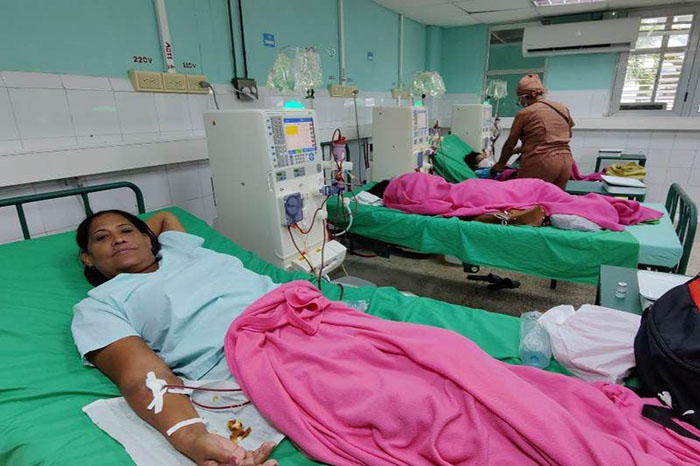 The hemodialysis service of the Dr. Agostinho Neto General Hospital, in this city, resumed its running in a stable manner and serves 102 patients from seven municipalities, after more than a month stopped waiting for the installation of a new water treatment plant by reverse osmosis.
The hemodialysis service of the Dr. Agostinho Neto General Hospital, in this city, resumed its running in a stable manner and serves 102 patients from seven municipalities, after more than a month stopped waiting for the installation of a new water treatment plant by reverse osmosis.
The Master of Science Yudelmis Pupo Mesa, head of nursing at the service, told the Venceremos newspaper that for a couple of weeks the plant has been stably processing good quality water, which improves the treatment of nephrotics and notably increases the quality of that replacement therapy for kidney function.
With water at optimal values to make up the dialysis fluid that participates in blood purification, sepsis is prevented in patients and the operation of hemodialysis machines, also known as artificial kidneys, is improved, she explained.
She added that the plant’s capacity to produce two thousand liters of water per hour, enough for the 20 available kidneys – of which only 18 function – also allows for the complete treatment that each patient requires, lasting between three and four hours, three times a week, according to medical indications.
During the time in which the hemodialysis service was closed, constructive actions were undertaken that included a new instrumentation room, the change of climate and lighting systems, veneer of plateaus, replacement of marquetry and furniture and painting, Dr. Pupo Mesa said.
The head of nursing of the vital service also said that important supplies required for replacement therapy of renal function through hemodialysis were received, especially dialyzers, needles, branches, syringes, among other expendable materials.
Although in Cuba the service is offered free of charge, according to estimates its cost ranges from about 100 dollars per patient, each treatment session that is carried out three times a week and a year totals 156 and includes the transfer of the patient by taxi to the hospitals, from the most remote places of the territory.
The economic, commercial and financial blockade imposed by the United States more than 60 years ago limits Cuba’s access to hemodialysis technology, one of the most expensive for health budgets in any country in the world.
Translated by Liubis Balart Martinez